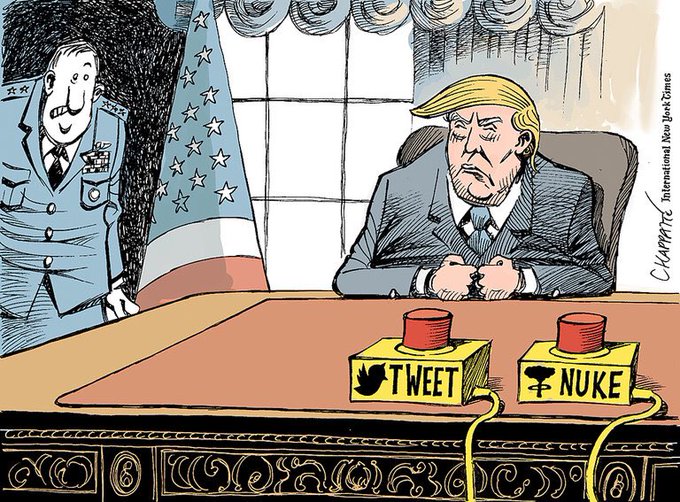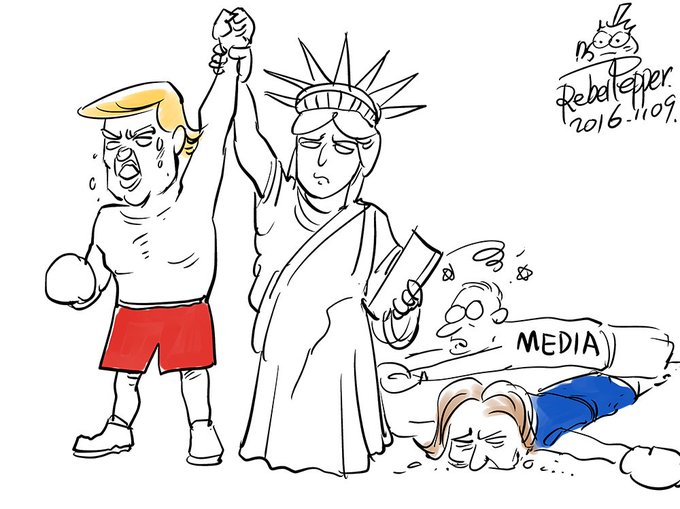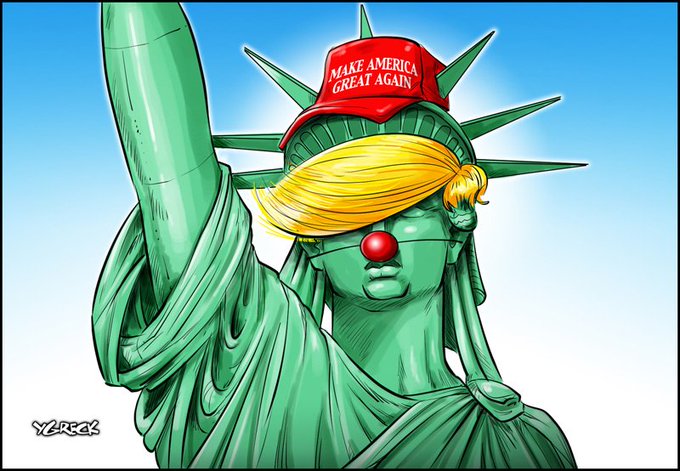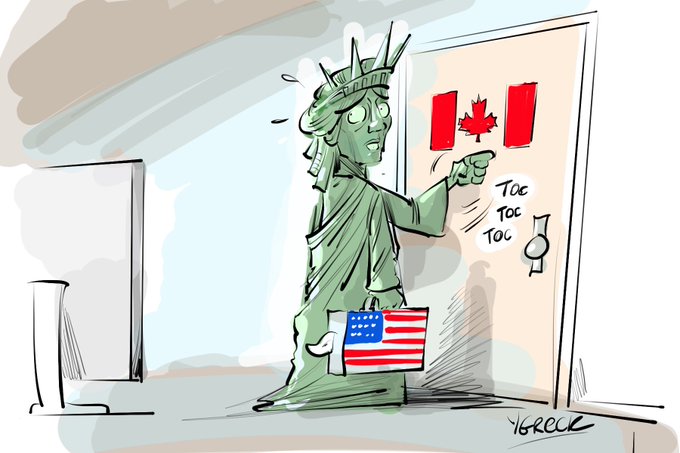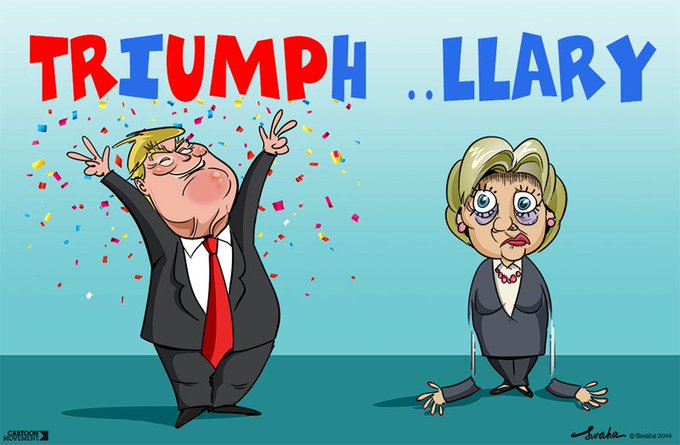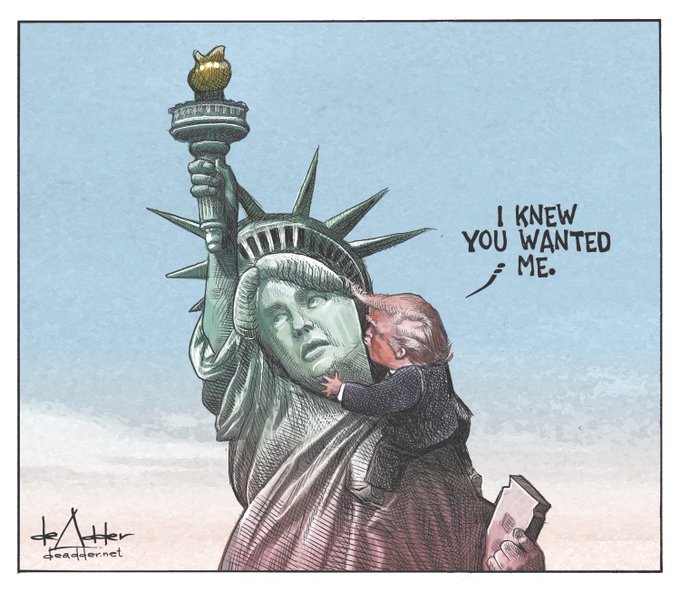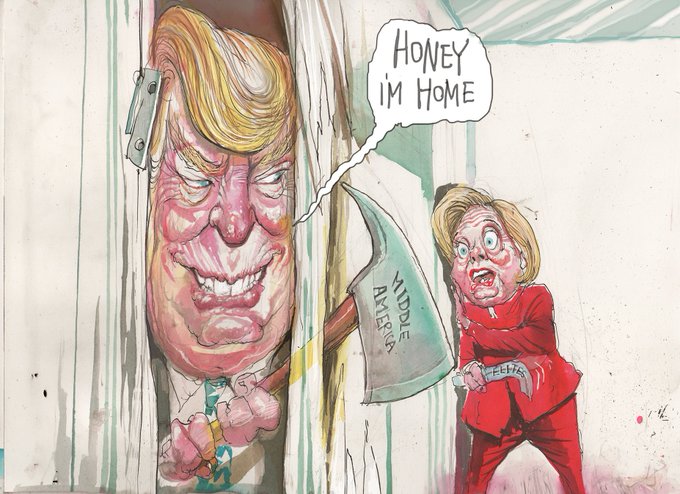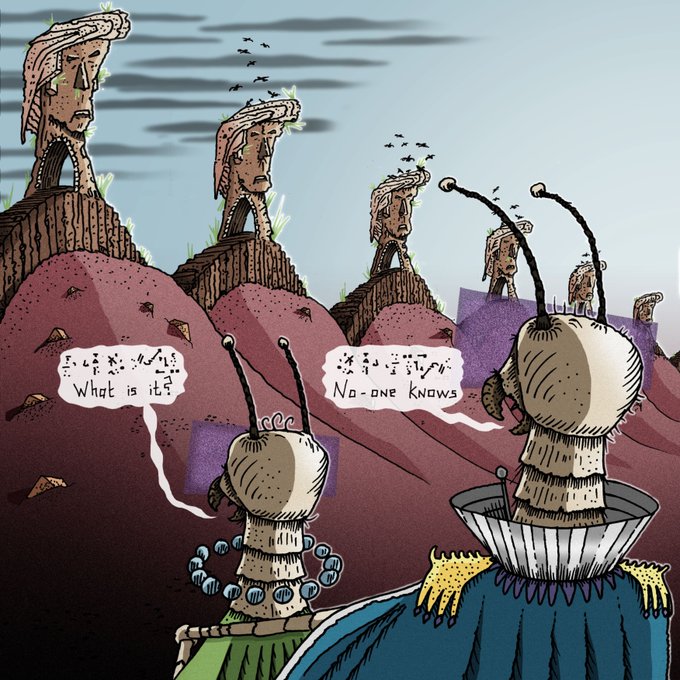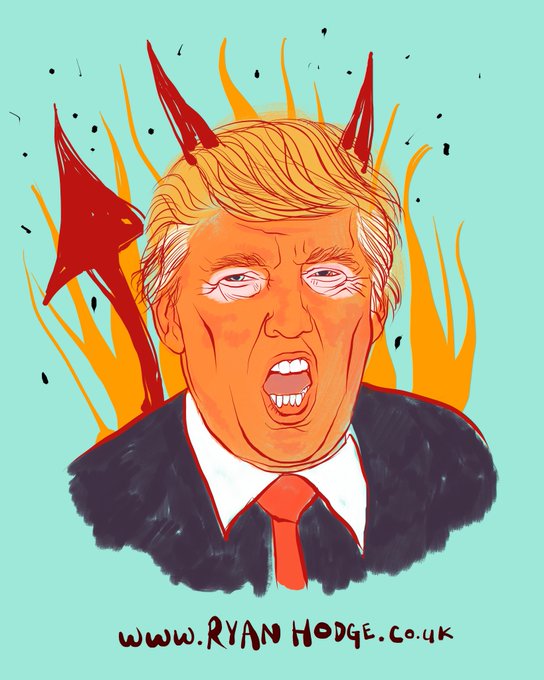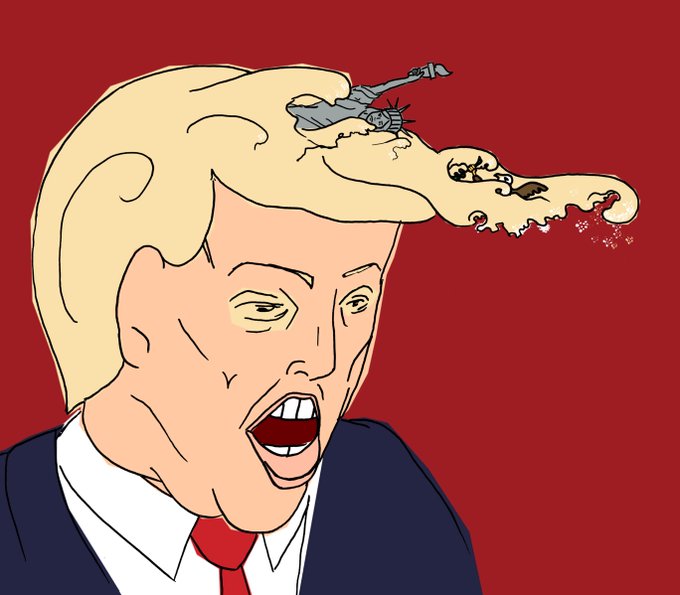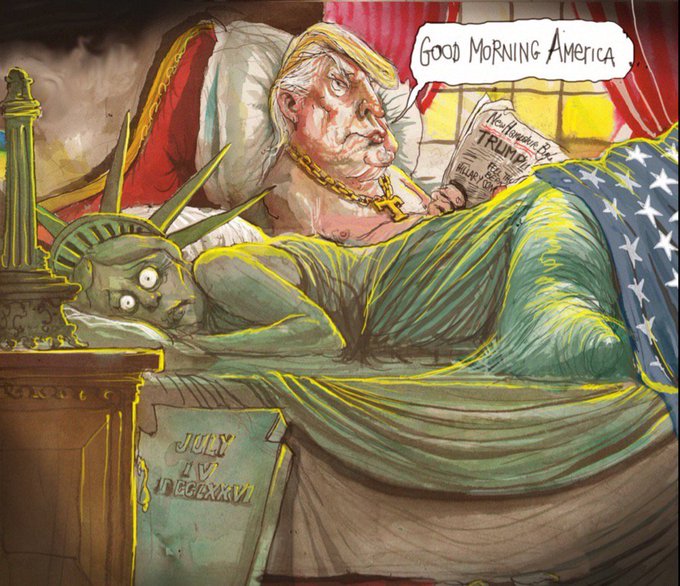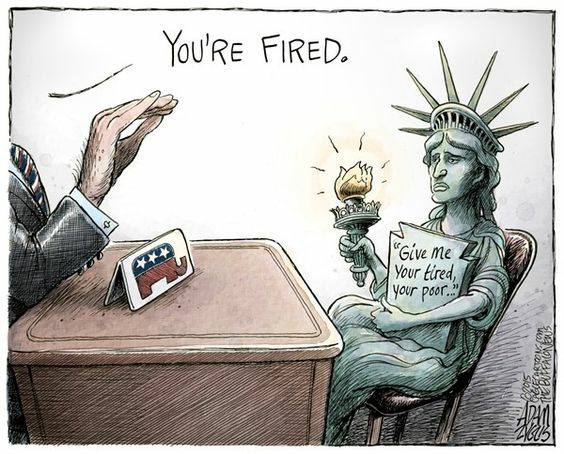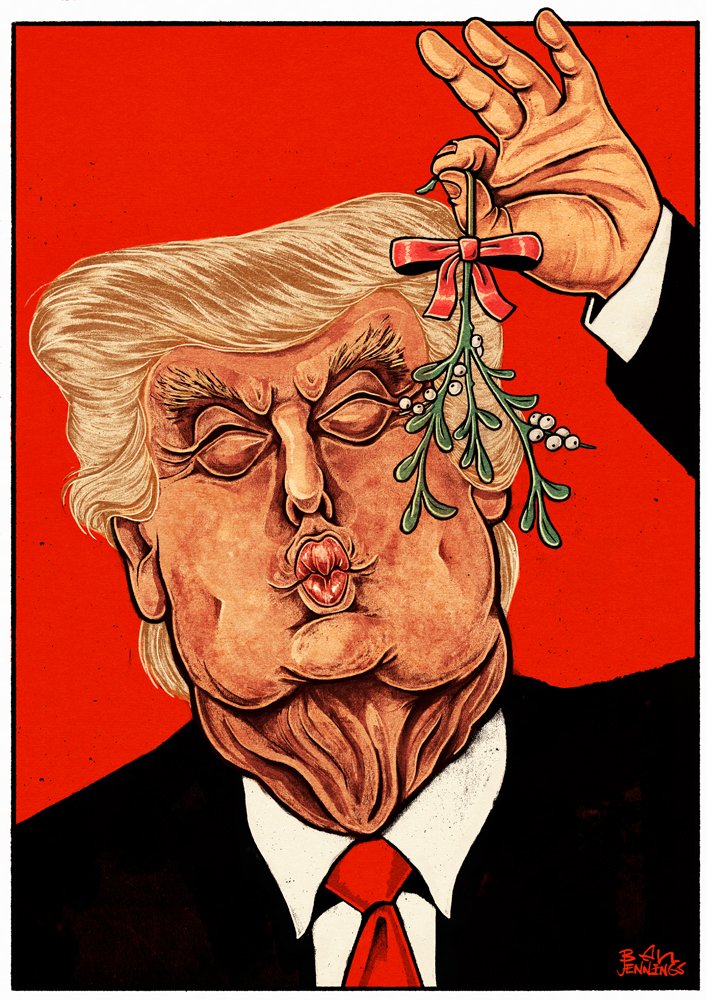Publicly they seemed confident, but in private her team
admitted her chances were 'always fragile.'
have some news. It’s not good.”
Hillary Clinton’s communications director Jennifer
Palmieri filled the candidate in as the plane landed in Iowa, with campaign
manager Robby
Mook in the huddle. Jim Comey’s letter had hit when they
were still in the air, without wifi, and now they were all at once processing
the news and a game plan and the worry the FBI director had delivered an
“existential” hit to a campaign already more nervous than it had been letting
on.
Clinton was sitting up in her private cabin, chatting
with childhood friend Betsy Ebeling.
“You knew we weren’t done,” Palmieri told the boss.
“I knew there would be something," Clinton told
them with a slight smile. “So here it is.”
Here it was. Again. More emails, pretty much the only
thing her campaign was about even before it started. And for Clinton, who sees
her life as the story of battling back unhinged and unfair partisan attacks,
this was the latest round of Them against Us.
Everything that Democrats and pretty much anyone else
thought they understood about politics was proven wrong this year with a
resounding exclamation mark Tuesday night. All along, this looked like a hard
fight, but never a fight that she seemed to be losing, even on the darkest days
on a campaign that never quite felt like it was winning, either.
Democrats and many others are now in crisis, wrapping
their minds around the reality of a President Donald Trump. But the crisis is
sharpest in Clinton campaign headquarters: not only do they feel like
everything is about to go deeply, collapse-of-America wrong, but it’s going to
happen because she failed, and they failed her.
Clinton and her operatives went into the race predicting
her biggest problems would be inevitability and her age, trying to succeed a
two-term president of her own party. But the mood of the country surprised
them. They recognized that Sanders and Trump had correctly defined the
problem—addressing anger about a rigged economy and government—and that Clinton
already never authentically could. Worse still, her continuing email saga and
extended revelations about the Clinton Foundation connections made any
anti-establishment strategy completely impossible.
So instead of answering the question of how Clinton
represented change, they tried to change the question to temperament, what kind
of change people wanted, what kind of America they wanted to live in. It wasn’t
enough.
Using Trump as a foil and a focus, she hit on a voice
and an argument for why she should actually be president that perhaps only she
could have, and that she’d struggled for so long to find on her own. That
wasn’t enough, either.
Meanwhile, members of her staff harnessed all the money
and support they could to out-organize, first in the primaries and then in the
general, grinding out victories while her opponents had movements.
None of it was enough, though all of it should have
been, and likely would have been for another candidate. She couldn’t escape
being the wrong candidate for the political moment.
Interviews over the closing weeks of the 2016 campaign
with members of Clinton’s innermost circle, close advisers and other aides
reveal a deep frustration with their failure to make a dent, a consuming sense
that their candidate’s persecution paranoia might actually be right, and a
devastating belief that they might never persuade Americans to vote for her.
“There was no way to generate momentum,” one top adviser
said.
Any positive story line from Clinton “was always
fragile,” admitted that adviser, and issues related to the emails inevitably
stripped away any uptick in Clinton's favorable ratings.
“This has been a campaign that has thrived on moments,”
Mook said in an interview in his office, in the back corner of the Brooklyn
headquarters a week before the election. “When voters see the candidates
juxtaposed, we do better. When they’re not juxtaposed, he normalizes. He
becomes the Republican nominee, instead of Donald Trump.”
All along, Mook was dialing David Plouffe, the Obama
2008 campaign manager who was the person who could see the long game, who could
mock the bed-wetters. Plouffe had pushed Clinton to hire Mook for the top job
in 2015, and in the spring, when Clinton nearly lost Iowa, got creamed in New
Hampshire and was so on edge about Sanders in Nevada that Mook could have
gotten fired, Plouffe moved in to save him. He’d become Mook’s campaign
therapist.
The polling drop since the third debate was worse than
the camp had been counting on, Mook worried, and with WikiLeaks every day
dropping fresh chum in the water from campaign chairman John Podesta’s email
hack, nothing else was breaking through.
Monday night, a week out from Election Day and the FBI
fallout still pulling points off their daily internal numbers, Plouffe called
Mook back.
“Wouldn’t you like to be back at that?” he joked about
the problems breaking through before Comey.
They got used to things going wrong, as they had from
the very beginning.
To several top aides, the best day of this whole
campaign was a year ago, before the Sanders headache or the Trump threat really
materialized, when the House of Representatives hauled Clinton and her emails
in with the single aim of destroying her candidacy over Benghazi.
Republicans on the House Select Committee on Benghazi
greeted the Clinton team that morning in 2015 with an October surprise:
multiple thick, black binders of emails from their investigation of the
Benghazi attack that had not been previously shared with anyone.
Clinton’s former State Department chief of staff and
counselor Cheryl Mills was already in the House committee’s witness holding
room, and she called Clinton at her Whitehaven home. “You need to get here
now,” Mills said.
Clinton campaign press secretary Brian Fallon, standing
in the back of the committee room with Podesta, wanted to leak the news to the
media that Clinton was about to get ambushed. Podesta told him to wait to see
what top adviser Jake Sullivan and Mills could do in the hour they had before
Clinton was sworn in.
As she sped through the years-old emails to prep her
former boss, Mills watched on live television as Clinton’s van left her mansion
and made its way to the Hill. About 20 minutes later, the doors burst open and
Clinton entered, flashbulbs popping behind her. She quietly took a seat next to
Sullivan, who began walking her methodically through the binders, page by page,
email by email. Clinton didn’t have time to take notes, nodding along and
signaling to Sullivan to move on when she had grasped the context of the
emails.
They didn’t make it through one full binder before
Clinton had to go into the hearing room.
“Well, let’s get this over with,” she said as she stood
and headed for the stand.
She delivered tirelessly, knocking back the Republicans
one by one, complete with facial expressions that have launched GIFs that have
been all over Democrats’ Facebook and Twitter feeds ever since. She renewed her
shaken team’s faith that she was the leader they wanted to follow into what was
already shaping up to be a dejecting primary battle.
“It reminded people of everything they like about her,”
said one of her senior advisers. “It’s toughness, but also a calm, adult
presence of someone you can actually see being president of the United States.”
But two even more critical things happened that day: The
inner circle for 2016 crystallized and has remained almost impenetrable since,
with Sullivan, Mills, Podesta, Palmieri and Huma Abedin all invited back to
Clinton’s house in Washington afterward to celebrate with takeout food.
And it removed Benghazi from the list of attacks that
could be credibly leveled against her in 2016.
All that was left were the emails. They never could
escape the emails.
***
It’s an amazing fact: from Mook on down, every senior
member of Clinton’s team showed up on the final day in the same role as on the
day she launched. No one was fired. No one was layered, which is the standard
kiss of death in Clintonworld. Top people signed on warning friends and family
to brace for humiliating news stories about being sacked. Deep into the
primaries, they were still making the same joke about problems on the horizon,
“Don’t worry about that—it’ll be for the second team to come in and fix.”
“She made a decision that this was her team,” said Jim
Margolis, the man behind many of the ads and most of the convention planning.
Clinton picked Mook, instead of promoting a campaign
manager out of loyalty from her own inner circle. She persuaded Podesta, who
had kept his distance in 2008 because he didn’t get along with polarizing top
strategist Mark Penn, to join as the guiding hand and the buffer for all the
“friends of” who streamed in with advice and second-guessing.
But that didn’t mean there weren’t serious problems.
Bill Clinton complained throughout that Mook was too focused on the ground game
and not enough on driving a message-based campaign. Without a chief strategist
in the mold of Penn or David Axelrod, the campaign was run by a committee of
strong-willed aides, struggling to assert themselves in the same space.
Longtime consultant Mandy Grunwald and Palmieri grappled at points over message
control as Palmieri worked her way into the inner circle. Mook and strategist
Joel Benenson barely spoke to each other for the month of April, battling over
their roles.
Most weren’t reading WikiLeaks, or the coverage of
WikiLeaks—there are signs in the bathrooms in campaign headquarters warning
against password phishing, and they’re prohibited from signing onto the website
from their computers at headquarters. But those who read the news coverage
admitted it created an odd sense of hierarchy: You don’t want to be in them,
one aide explained, but you don’t want to not be in them either.
The emails released by Wikileaks created an odd sense of
hierarchy: You don’t want to be in them, one aide explained, but you don’t want
to not be in them, either.
What the campaign considered the one big leak—that
Clinton was considering retired Adm. Jim Stavridis for VP—happened after
Clinton blurted it out herself in a meeting with a wider circle of consultants.
People had never seen anything like the email everyone in the meeting got from
Podesta after that.
The key on their end, aides agree, was learning not to
surprise Clinton with bad news. Eight years ago, staffers either kept not
realizing or not telling her that Obama was going to win. Maybe they were were
too busy knifing each other, blaming the losses on something that someone else
did wrong.
"She doesn't micromanage, but she wants to know
what is going on, especially if things aren't working according to our
plan," Benenson said.
The worst was New Hampshire, the moment when Brooklyn
actually felt like the ground might be shifting under them and Sanders would
run away with it. Mook told her she was going to lose. He told Bill Clinton
too: by 20 points.
Deputy communications director Kristina Schake sent an
intern to get a big supermarket layer cake to try to lighten the mood.
“Dig in,” Mook told the staff, digging into the pun,
“because we’re about to get layered.”
***
The pressure Clinton felt to stop Trump was unnerving,
her aides said.
“I’ve got to deliver tonight,” she said in her final
prep before the first debate (“the moment of maximum peril,” one aide called
it), awkwardly but strikingly for aides surprised by how scared she was feeling
about being the last person to stop a person she genuinely thinks is unfit to
serve.
She did deliver, in all three debates. And those wins
gave Clinton such a boost in the polls that as October closed, confidence in
her camp spilled more easily into the open. The Democratic nominee looked
happy, almost as if she were enjoying it.
So when Comey shook up the campaign, 11 days before
Election Day, to announce new information in the email probe, Clinton’s team
insisted on offense.
But they knew it changed the math, made Arizona slip
just out of their fingers, destroyed any chance of a really big or clean win,
even with that “Never mind!” letter from Comey on the final Sunday.
There were up times—Trump stand-in Phillippe Reines
chasing Clinton around the room during debate prep after the Republican stalked
her on stage in St. Louis, then grabbing her in a bear hug, both of them
laughing. The “full hook!” shouts in their hold room in Las Vegas when Clinton
delivered the line that Grunwald had come up with about how Trump had even once
complained that the Emmys were “rigged” and when he Alec Baldwin’d a “Should’ve
gotten it” into the microphone.
READ MORE:
GettyImages-621534164.jpg
WASHINGTON AND THE WORLD
How Will the World Change After the Election?
By SUSAN B. GLASSER
ken bone 2.jpg
2016
The Accidental Celebrities of 2016
By TAYLOR GEE
GettyImages-612898210.jpg
2016
The 320 Europeans Out to Protect America’s Elections
By BEN WOFFORD and BENJAMIN ORESKES
But those were the exceptions. “Best seven minutes of
the last 15 months of my life,” Palmieri had confided to people in Philadelphia
on Sept. 13, as she watched President Barack Obama gleefully rip Trump, voicing
the frustration they felt in Brooklyn about how differently Clinton and Trump
were treated on the campaign. Two days before, she and everyone on the campaign
and everywhere else had watched that video of Clinton collapsing, wondering
what it would mean.
***
To the end, top aides remain convinced there’s more to
Trump’s ties to Russia, debt held in Moscow that’s kept him cowed. They
finished with clear proof in their minds that Republicans, reporters, most of
America were out to get Clinton—so much so, in their minds, that it enabled a
threat to everything the country’s supposed to be about glide into the White
House without any real examination of his policies, his finances, his
temperament or anything else.
On the Saturday before the election, Clinton’s team
released a seven-minute video, entitled “The Story of the Campaign,” full of
scenes of Clinton celebrating with aides, sleeping on Bill Clinton’s shoulder
as they flew through the night after losing New Hampshire.
There were outtakes from Clinton’s announcement video.
“I know you think I’m crazy. You’re right,” she laughs into the video camera.
“Watching that,” one top aide said, “You’d think the
campaign was so much fun.”































